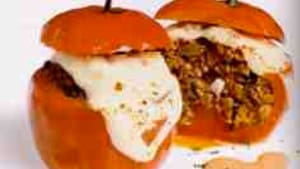Stay in the Loop
BSR publishes on a weekly schedule, with an email newsletter every Wednesday and Thursday morning. There’s no paywall, and subscribing is always free.
I cook, therefore I am: Why isn't cooking a respected art?
Reflections on culture and gastronomy

I started today. I got in the car and drove 55 miles to Atlantic Cape Culinary Academy. I filled out the paperwork that would permit me to be paid, found my cubicle, printed out my notes, swallowed coffee, walked to my classroom, said hello and started talking.
What am I talking about? That's always a good question. People, including me, ask it all the time. Today, I was talking about making sense of a college course called Culture and Gastronomy.
I'm intimidated by the words myself. One word sounds pretty pompous, the other has so many meanings that we can slip among them without noticing that we've changed what we're talking about.
And yes, I have to admit that I'm slipping around here myself. I decided to focus on what they call Modernist Cuisine because I've wondered for a long time how Modernism: The Trend affected Modernism: The Fashion in Food.
Rise and fall of the Tastykake
In fact, I've wondered for years about food's position as a weird outlier in the fashion world. We can go naked, but we can't go hungry. And food swings— or does it rotate?— in long arcs of High Fashion and Low, the rise and fall of the Tastykake completely underlapping the rise and fall of Cuisine Minceur.
Can this mean anything? Is it just trivial? Or is something hiding? It's not necessary to me to know— I can love the food I cook and the food I eat and it doesn't have to mean anything. I can be happy that it makes me and us happy, that we camp on the side of the angels when we cook beautifully and eat well. But now, I've got to put up or shut up.
Nine students at one of the country's best culinary schools sit in front of me with notebooks open. I know a lot of stuff, but do I know what I'm talking about? The only way I'm going to find out is to start talking and see what comes out of my mouth.
What's "'modern'?
Is this fair to them? Well, I've taken plenty of courses where the professor put out all she knew and didn't even take a crack at the big questions. Some of those courses were the best ones of my life, but I'm aiming for something better.
Here's what my notes have for 'Modern':
"Modern" means
"¢ a significant break with the past, founded on
"¢ new or newly diffused knowledge and/or
"¢ new moral perspective
It's a backwards definition, one I built by starting with what I know about modern cooking and going backwards. Fair enough.
Cathedrals and cartwheels
Then there's Culture. I've got my anthropants down around my knees here. I remember pages of "definitions" and seminars of circular discussions. You gotta stop somewhere. I stop like this:
Culture is human nature as processed by humans. Cathedrals and cartwheels, ways of talking and the grammar of walking. Let's assume that a person can participate in more than one culture and that cultures can be large and inclusive (Han Chinese) or small and particular (Bolivian soccer fans).
Let's allow that culture is usually passed from parents to children, but that transmission isn't perfect. We have whisper-down-the-lane rather than digital duplication. Consequently, cultures change. They change because of duplication drift (you ain't your daddy) and also because cultures meet when peoples meet.
Sometimes when cultures meet, you get a mash-up: characteristics thrown together, like in red-bean ice cream. Sometimes (more often) you get genuinely new products: spaghetti and meatballs. The term for this is syncretism (used slightly differently in philosophy).
If Mom had the time
All of this brings me to my working definition of Gastronomy:
The food that mom would have made if she had had the time, money, energy, information and community support to do so.
Let's take a minute with that if. If there isn't enough food to go around, or if there are only a few kinds of food, then there's no Gastronomy. Gastronomy depends on abundance and variety. That's the first characteristic of Gastronomy.
"¢ Second: There is a value attached to food beyond nutrition.
"¢ Third: That value itself can be the subject of discussion. Two types: aesthetic and social.
"¢ Fourth: Gastronomy is about processed food— food that we have transformed. This is key.
So I go on from there: Culture is cooking, ya see. Why do we cook at all? Who are we, anyway? Do I know what I'm talking about? Well, yeah, I've spent a lot of time with this stuff. Will my knowing about it take these students some place new?
As we say in Cancerland (my current address): Stay tuned.♦
Adopted from Lynn Hoffman's blog, Radiation Days.
What am I talking about? That's always a good question. People, including me, ask it all the time. Today, I was talking about making sense of a college course called Culture and Gastronomy.
I'm intimidated by the words myself. One word sounds pretty pompous, the other has so many meanings that we can slip among them without noticing that we've changed what we're talking about.
And yes, I have to admit that I'm slipping around here myself. I decided to focus on what they call Modernist Cuisine because I've wondered for a long time how Modernism: The Trend affected Modernism: The Fashion in Food.
Rise and fall of the Tastykake
In fact, I've wondered for years about food's position as a weird outlier in the fashion world. We can go naked, but we can't go hungry. And food swings— or does it rotate?— in long arcs of High Fashion and Low, the rise and fall of the Tastykake completely underlapping the rise and fall of Cuisine Minceur.
Can this mean anything? Is it just trivial? Or is something hiding? It's not necessary to me to know— I can love the food I cook and the food I eat and it doesn't have to mean anything. I can be happy that it makes me and us happy, that we camp on the side of the angels when we cook beautifully and eat well. But now, I've got to put up or shut up.
Nine students at one of the country's best culinary schools sit in front of me with notebooks open. I know a lot of stuff, but do I know what I'm talking about? The only way I'm going to find out is to start talking and see what comes out of my mouth.
What's "'modern'?
Is this fair to them? Well, I've taken plenty of courses where the professor put out all she knew and didn't even take a crack at the big questions. Some of those courses were the best ones of my life, but I'm aiming for something better.
Here's what my notes have for 'Modern':
"Modern" means
"¢ a significant break with the past, founded on
"¢ new or newly diffused knowledge and/or
"¢ new moral perspective
It's a backwards definition, one I built by starting with what I know about modern cooking and going backwards. Fair enough.
Cathedrals and cartwheels
Then there's Culture. I've got my anthropants down around my knees here. I remember pages of "definitions" and seminars of circular discussions. You gotta stop somewhere. I stop like this:
Culture is human nature as processed by humans. Cathedrals and cartwheels, ways of talking and the grammar of walking. Let's assume that a person can participate in more than one culture and that cultures can be large and inclusive (Han Chinese) or small and particular (Bolivian soccer fans).
Let's allow that culture is usually passed from parents to children, but that transmission isn't perfect. We have whisper-down-the-lane rather than digital duplication. Consequently, cultures change. They change because of duplication drift (you ain't your daddy) and also because cultures meet when peoples meet.
Sometimes when cultures meet, you get a mash-up: characteristics thrown together, like in red-bean ice cream. Sometimes (more often) you get genuinely new products: spaghetti and meatballs. The term for this is syncretism (used slightly differently in philosophy).
If Mom had the time
All of this brings me to my working definition of Gastronomy:
The food that mom would have made if she had had the time, money, energy, information and community support to do so.
Let's take a minute with that if. If there isn't enough food to go around, or if there are only a few kinds of food, then there's no Gastronomy. Gastronomy depends on abundance and variety. That's the first characteristic of Gastronomy.
"¢ Second: There is a value attached to food beyond nutrition.
"¢ Third: That value itself can be the subject of discussion. Two types: aesthetic and social.
"¢ Fourth: Gastronomy is about processed food— food that we have transformed. This is key.
So I go on from there: Culture is cooking, ya see. Why do we cook at all? Who are we, anyway? Do I know what I'm talking about? Well, yeah, I've spent a lot of time with this stuff. Will my knowing about it take these students some place new?
As we say in Cancerland (my current address): Stay tuned.♦
Adopted from Lynn Hoffman's blog, Radiation Days.
Sign up for our newsletter
All of the week's new articles, all in one place. Sign up for the free weekly BSR newsletters, and don't miss a conversation.

 Lynn Hoffman
Lynn Hoffman